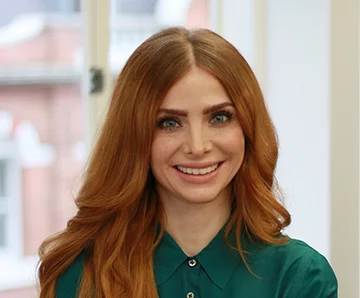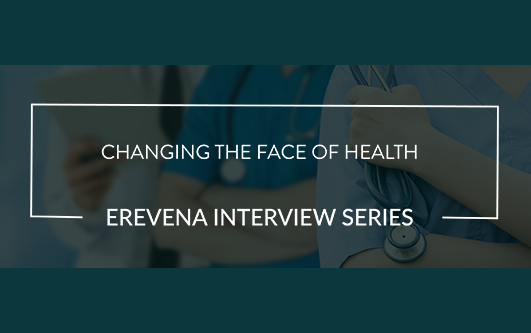Andrea Berchowitz, Co-founder and CEO at Vira Health talks to Hazel Mulhare, Partner at Erevena about how digital therapeutics are shaking up the help available for menopausal women.
Tell us a bit about yourself
Working in women’s health has always been an interest of mine. During my 10 years at McKinsey in South Africa and then the UK, I worked in women’s health in both the public and private sector, in areas like family planning and maternal healthcare. I then had the opportunity to spend a year at The Bill and Melinda Gates Foundation. It was an incredible experience, it’s arguably the biggest platform for impact. However, it became clear to me that the charity sector wasn’t where I wanted to be right now.
I knew London had a lot of really cool innovation around women’s health, which excited me. There are so many innovative start-ups looking at fertility, menstruation, and parenting topics. However, at the time, it seemed like no one was trying to figure out how to support older women, especially around the topic of menopause.
“Why is it called the menopause? We don’t say the cancer? This seems to say that it’s the same for every woman, whereas in reality each woman’s experience of menopause is unique and individual.”
Where did the inspiration for Vira come from?
I met my co-founder, Rebecca Love (PhD) who has a background in chronic disease. Honestly, I just really liked her, and we got along from the beginning. We discovered a shared interest in women’s health and in particular the massive impact menopause treatment can have on women’s longer-term health.
We were also both super fascinated by how little research there is on female-focused issues – especially menopause. The statistics are super frustrating. Amazingly, female-focused conditions receive less than 5% of healthcare R&D, and women are often not included in clinical trials and sex-disaggregation of data is not a legal requirement. We bonded early over Caroline Criado Perez’ book ‘Invisible Women’ and wanted to do something that really tackled the ‘gender data gap’ in healthcare. Menopause felt like the right place to start because it allowed us to focus on an immediate need for women – relieving the symptoms of menopause – as well as tackling some of the larger, unanswered questions in women’s health around cardiovascular disease, diabetes, osteoporosis and even Alzheimers.
Tells us about Stella
Our first product is an app called Stella which supports women to manage the most common pain points of menopause. Our vision for Stella is that it is ground-breaking on several dimensions. First, like many areas of women’s health, it is a ‘taboo’ topic. If we look more broadly, it’s clear that tackling a complex condition like menopause really pushes the boundaries on personalised medicine and the use of digital therapeutics for other areas. Finally, menopause often intersects with a critical career stage. It usually occurs between ages 45 and 55 – which is also the age bracket during which women are most likely to move into top leadership positions. If we want to continue to move the needle on the number of women in leadership roles, we need better care options.
Why the focus on digital therapeutics?
Digital therapeutics, or ‘software as a drug’ are evidence-based therapeutic interventions driven by high quality software programs. With Stella, doctors will be able to prescribe the app to women coping with menopausal symptoms. Women will get access to personalised multi-week programmes that support her to manage the issues that affect her life, including insomnia, hot flushes, weight gain, incontinence – among others – on her own device and on her own schedule.
The treatment centres on behavioural and lifestyle changes supported by a human menopause coach who understands what a given woman is going through, what has worked and what hasn’t. Because of the digital nature of our approach, data can be collected and analysed both to personalise a woman’s treatment and a way to answer some of the bigger questions around menopause. We have a strong academic ethos in the company, and really look forward to contributing to the advancement of research in women’s health.
How easy was it to get funding during lockdown?
We launched the company in December 2019 and were in full fund-raising mode during lockdown, speaking to well over 60 funds and Angels! Luckily, we had help from early supporters like you Hazel! When you flagged us to a female VC network, that opened up a lot of interesting conversations, including some of the first angels to commit and one of our VC funds. I suppose the silver-lining of lockdown is that we could really focus. It turns out you can do a lot of zooms in a day, but the intensity was exhausting. Raising funds pre-product is always hard and raising as two female first time founders is an uphill battle. Less than 1% of funds in the UK go to female co-founders. Obviously, the picture is even more stark when you add race. If you meet a woman of colour who has raised VC-funding she has beaten nigh on every odd.
“I didn’t realise how hard it would be for two female co-founders to raise funds.”
It’s not that people are misogynists. Rather, it is that the pattern recognition they rely on doesn’t recognise female founders, it’s a story of unconscious bias rather than malicious intent. In the end, we were really delighted with the group of investors that backed us. They are all fully aligned on how important it is to improve menopause care and see Stella as a cutting-edge product in digital therapeutics and personalised medicine.
What challenges do you face?
We have all the challenges of an early stage start-up trying to do something new – plus the issues that come with a ‘taboo’ topic. That manifests itself in interesting ways. Whenever we talk to a service provider or a potential hire, we often have to say, ‘have you heard of menopause?’. Honestly, it’s been a nice litmus test of the type of people we want to work with. When people seem uninterested – or even grossed out – we know they aren’t for us.
However, it’s also the case that starting this company has helped us meet a group of amazing women who have been working in the tech industry for 20+ years. They are all so motivated to be working on a product that they know will help them and their friends immediately. That’s really rewarding.
Where is Stella right now?
We plan to launch the first version of the Stella app in the Spring. Right now, we are focused on talking to as many women as possible and testing different aspects of our product. It’s super exciting to see Stella in the hands of women and hear what works (and what is an absolute failure!). We have women signing up on the website for the closed launch of the app.
We recently hired a Chief Medical Officer, Dr Michelle Griffin. It’s great to see how interested gynaecologists are in what we are doing. It is a really important indicator for us that the medical community sees the value of what we are doing.
How did you pick the name Vira?
We chose to call the company ‘Vira’ as the shortened form of ‘Virago’ which Merriam Webster defines as both ‘a woman of great stature, strength, and courage’ as well as ‘a loud overbearing woman.’ The tension between those two meanings resonated with our own experiences.
What does the future look like?
There are 13 million women in the UK coping with menopause and 1 billion around the world who could all benefit from the Stella app. We see Vira Health helping to extend the working lives of women around the world and decrease the disability of chronic diseases in women. The company came to life during a global pandemic and a long overdue acknowledgement of the affects of structural racism. This has certainly highlighted the longstanding inequities in healthcare resulting in low quality care for women, especially those of minority backgrounds. Vira cannot solve all of those problems – but we do believe high quality menopause care is a major step in the right direction.
Hazel Mulhare is Partner at Erevena, an Executive Search firm focused on high growth and transformation. Erevena’s clients are amongst the fastest growing companies in the world: they are VC & growth equity backed; they are publicly traded & privately held companies transforming to grow. Hazel focuses on early-stage technology businesses, with a particular interest in Health and Deep tech. She works with founders to make key C-level, VP and Board level hires at seed, series A and series B stage.
Share this article:












